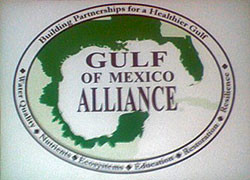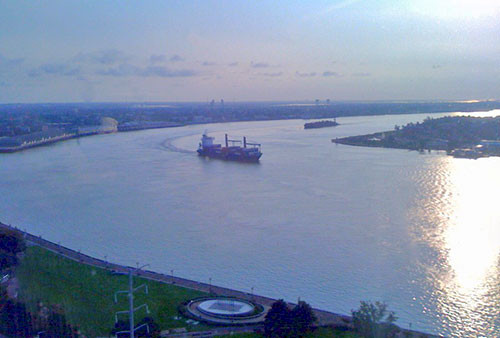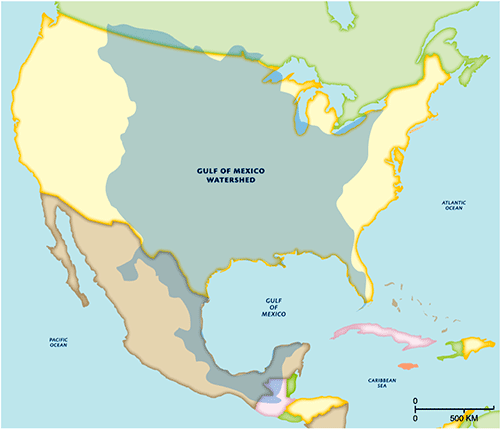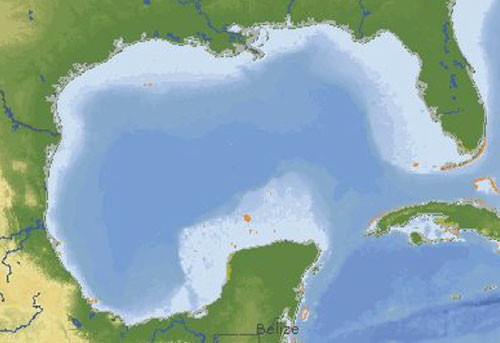Developing a Gulf of Mexico report card
Bill Dennison · | Environmental Report Cards |Our IAN group likes to tackle large complex projects on iconic ecosystems, while working with interesting and knowledgeable people. We love the immersive learning that comes with challenging projects and good teams. The Gulf of Mexico report card project is one of those exciting projects on an iconic ecosystem with a good team.

My first direct report card experience with Gulf scientists was back in August 2011. It came after spending a lot of time in Australia on GoToMeeting® calls with Dr Larry McKinney and Dr Wes Tunnell from the Harte Research Institute for Gulf of Mexico Studies, Texas A&M University, and Mark Harwell and Jack Gentile from Harwell, Gentile & Associates, and Heath Kelsey from our IAN group. I traveled to New Orleans to the Joint Meeting of the Gulf of Mexico Alliance and Hypoxia Task Force. Dr. Larry McKinney and I led a session titled 'Gulf Report Card'. There were approximately 500 people attending this Joint Meeting, with representatives from each of the five Gulf of Mexico states (Texas, Louisiana, Mississippi, Alabama, and Florida) and a few Mexican scientists also in attendance. Dr. Porfinio Alvarez-Torres spoke about the various Mexican efforts in the six Mexican states that border the Gulf and apologized for his 'Spanglish' (his English was excellent, so the apology was unnecessary). But I was struck by the preponderance of southern accents in the U.S. scientists (many monosyllabic words became multisyllabic, y'all). Cuba was not represented and due to fact that Cuba is not a member of the United Nations, they have not laid claim to the Exclusive Economic Zone which is 200 miles offshore based on the 'Law of the Sea' treaty. Cuba forms part of the eastern boundary of the Gulf of Mexico, so ultimately it would be appropriate to have input from their scientists for a Gulf wide report card.

At our report card session, Larry and I presented an overview of our Gulf of Mexico report card prospectus and I presented some examples of report cards that the Integration and Application Network and EcoCheck have worked on. Following this introduction, we had over two hours of vigorous and constructive discussion with the one hundred plus people who attended our breakout session. The main take home points that I gleaned from this discussion include the following: 1) The report card concept was roundly endorsed. While people had questions about the form that a Gulf of Mexico report card would take, the utility and importance of doing a report card was not in question. 2) Assessing the human dimensions was emphasized, thus using social and economic indicators, including aquatic and terrestrial indicators with marine indicators, and partnering with social scientists were suggested. 3) The recognition that the Gulf of Mexico report card will need to encompass a variety of scales was clear. The issues of regionalization, matching reporting with management units, inshore to offshore gradients and the shear size of the Gulf (9th largest body of water on the planet) were discussed. 4) The amount of interest that the report card has already generated, along with the cultural and ecological diversity involved, promises to make this report card process an extended, highly collaborative process. There was an interesting discussion about the role that report cards could have in eliciting behavior change, and how either high or low scores could be perceived. The audience included academic scientists, agency resource managers and scientists, non-government organizations and industry representatives, and it was interesting to hear their different perspectives.

I am very encouraged by the thoughtful and constructive dialog that occurred both at this workshop and at the Gulf Summit that Heath Kelsey described in his blog post. There are some excellent partners and organizations involved in the Gulf of Mexico, including the Gulf of Mexico Alliance, Gulf of Mexico Foundation and the Large Marine Ecosystem program. It is apparent to me that the timing is right for producing a Gulf of Mexico report card and we look forward to working with interesting people on a challenging and exciting project.

About the author
Bill Dennison

Dr. Bill Dennison is a Professor of Marine Science and Vice President for Science Application at the University of Maryland Center for Environmental Science.